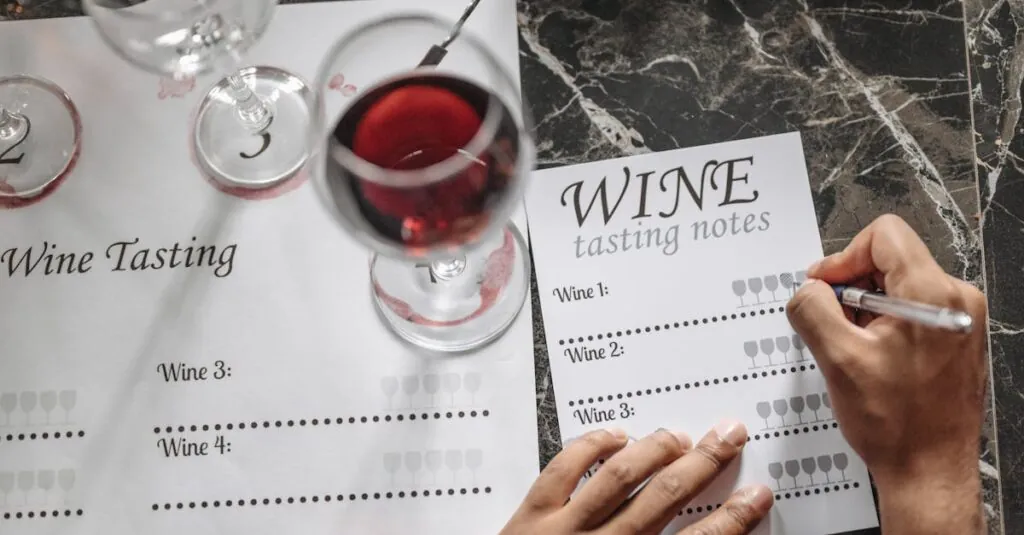Navigating a wine list can feel like deciphering ancient hieroglyphics, especially when the options range from “Chardonnay” to “Châteauneuf-du-Pape.” With so many choices, it’s easy to get lost in the sea of grape varieties and regions. But fear not! Wine list commentary is here to rescue you from awkwardly pointing at the menu like it’s a foreign language you never learned.
Understanding Wine List Commentary
Navigating a wine list requires an understanding of its intricacies. Commentary can enhance this experience, guiding selections with clarity.
Importance of Wine Lists
Wine lists serve as essential tools for diners. They not only showcase available selections but also highlight the establishment’s emphasis on quality and variety. A well-crafted list informs patrons about grape varieties and regions, making selections easier. Diners benefit from detailed options, enhancing their overall dining experience. Wine lists also reflect the restaurant’s identity, showcasing unique offerings. Selecting wines enhances meals, amplifying flavors and enjoyment.
Elements of Effective Commentary
Effective commentary brings wine lists to life. It includes detailed descriptions of flavor profiles, aromas, and food pairings. This commentary also specifies grape types, regions, and vintage years to inform decisions. Engaging language captures attention and piques interest. Descriptions should align with flavor profiles, enabling diners to envision their experience. Highlighting recommendations makes wine selection less daunting. Clarity in language fosters confidence, encouraging diners to explore new offerings. Each element contributes to a comprehensive understanding of the wine, enriching the overall dining experience.
Analyzing Different Types of Wine List Commentary
Understanding the nuances of wine list commentary is essential for making informed selections. Two primary sources of commentary exist: professional reviews and consumer reviews.
Professional Reviews
Expert reviews provide insightful analysis of wines. They include detailed assessments of flavor profiles, aroma characteristics, and winemaking techniques. Experts often evaluate wines based on strict criteria, allowing diners to trust their recommendations. Reviews from sommeliers and wine critics enhance credibility and offer a deeper understanding. A well-articulated professional review can empower diners in their choices by highlighting food pairings and vintage quality.
Consumer Reviews
Consumer reviews offer a different perspective on wine selections. Feedback from fellow diners reflects personal experiences and preferences. Such reviews can highlight unique flavor notes that professionals might overlook. Engaging with consumer-driven ratings helps build community knowledge around specific wines. Additionally, these reviews can guide diners toward options that match personal tastes. A balance of professional and consumer insights enriches any wine list commentary.
The Role of Wine List Commentary in Dining Experiences
Wine list commentary plays a critical role in enhancing the dining experience. It offers important insights that guide diners in their wine selections.
Enhancing Consumer Confidence
Clear, descriptive language instills confidence in patrons selecting wines. Detailed flavor profiles and vivid aroma descriptions help diners visualize the experience. When comments highlight food pairings, they encourage exploration and experimentation. Educated insights reduce intimidation, making unfamiliar options more approachable. Additionally, consistent themes across various wine reviews reinforce knowledge, empowering diners to make informed choices.
Influencing Purchasing Decisions
Wine list commentary directly affects consumers’ decisions at the table. Positive commentary about a specific wine can spark interest and prompt selections. By mentioning unique attributes or highlighting regional characteristics, restaurants can enhance allure. Furthermore, brief narratives about vineyards or winemakers create connections, fostering curiosity. Effective commentary not only shapes preferences but also encourages repeat orders, contributing to customer loyalty and overall satisfaction.
Crafting Your Own Wine List Commentary
Creating compelling wine list commentary enhances the dining experience. The right approach boosts confidence in wine selections.
Tips for Beginners
Begin by highlighting key flavor notes. Focus on aromas and textures that paint a vivid picture. Consider including specific grape varieties and regions associated with each wine. Use straightforward language that avoids jargon, ensuring clarity. Engaging sentences enrich the description while connecting wines to suitable food pairings. Shedding light on personal anecdotes can also create relatability and interest.
Common Mistakes to Avoid
Neglecting detailed descriptions often undermines wine commentary. Overusing technical terms may alienate patrons unfamiliar with wine. Failing to connect wines to food pairings can limit exploration. Ignoring audience preferences leads to missed opportunities for engagement. Skimming over the unique aspects of each wine diminishes its appeal. Avoiding brevity is essential; concise commentary holds attention and fosters curiosity.
Navigating a wine list doesn’t have to be intimidating. With the right commentary it transforms from a daunting task into an enjoyable exploration. Effective wine list commentary not only informs but also inspires diners to try new flavors and pairings.
By blending professional insights with personal experiences, wine lists can resonate more deeply with patrons. This connection fosters loyalty and enhances the overall dining experience.
Crafting engaging and clear descriptions makes wine selections accessible and exciting. As diners become more confident in their choices they’ll likely return for more memorable experiences. A thoughtfully curated wine list serves as a bridge between the culinary and vinous worlds, enriching every meal.





